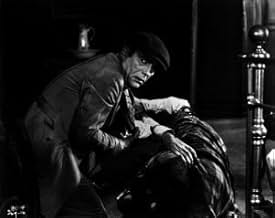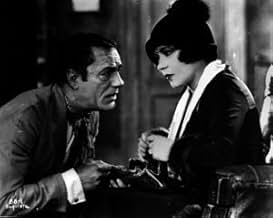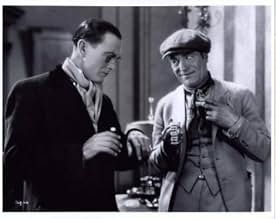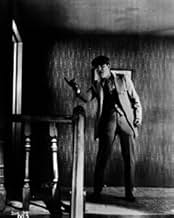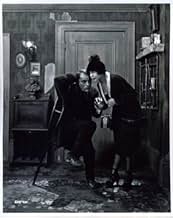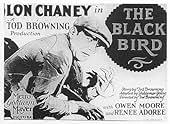Deux voleurs, le Blackbird et West End Bertie, tombent amoureux de la même fille, une artiste de boîte de nuit française dénommée Fifi. Chacun essaye de surpasser l'autre pour gagner son coe... Tout lireDeux voleurs, le Blackbird et West End Bertie, tombent amoureux de la même fille, une artiste de boîte de nuit française dénommée Fifi. Chacun essaye de surpasser l'autre pour gagner son coeur.Deux voleurs, le Blackbird et West End Bertie, tombent amoureux de la même fille, une artiste de boîte de nuit française dénommée Fifi. Chacun essaye de surpasser l'autre pour gagner son coeur.
- Réalisation
- Scénario
- Casting principal
- Récompenses
- 1 victoire au total
Andy MacLennan
- The Shadow
- (as Andy Maclennan)
Charles Avery
- Music Hall Patron
- (non crédité)
Lionel Belmore
- Music Hall Proprietor
- (non crédité)
Margaret Bert
- Minor Role
- (non crédité)
Peggy Best
- Minor Role
- (non crédité)
Louise Emmons
- Old Lady at Mission
- (non crédité)
Willie Fung
- Chinese Man
- (non crédité)
Fred Gamble
- Man Saying There's a Present for Fifi
- (non crédité)
Joseph Hazelton
- Man at Table in Music Hall
- (non crédité)
Cecil Holland
- Old Man at Mission
- (non crédité)
Bertram Johns
- Member of Bertie's Slumming Party
- (non crédité)
Avis à la une
If it weren't for the acting technique of LON CHANEY, here deceiving others by assuming a dual role, THE BLACKBIRD would be a lot less interesting to discuss. The plot at first promises to be intriguing, but soon becomes bogged down in a story of petty jealousy between two crooked men for the affections of a pretty girl.
OWEN MOORE is the aristocratic looking gentleman thief in love with RENEE ADOREE, as is Chaney. One of the film's saving graces are the close-ups of Chaney glowering at Moore when he realizes he's winning the heart of the girl that both of them love. Chaney uses all of his facial mannerisms in a way that makes the screen titles almost unnecessary since he tells everything with his eyes and his body movements.
But the thin plot is the culprit here. Many scenes drag on too long without sufficient reason to and the plot is ultimately a weak one by any standards. Todd Browning does get a terrific performance from Chaney, though, and that's the chief reason for watching in the first place.
The tawdry atmosphere of the Limehouse London scenes is effective but the story's ending is a weakness.
Summing up: Highly watchable for Chaney alone.
OWEN MOORE is the aristocratic looking gentleman thief in love with RENEE ADOREE, as is Chaney. One of the film's saving graces are the close-ups of Chaney glowering at Moore when he realizes he's winning the heart of the girl that both of them love. Chaney uses all of his facial mannerisms in a way that makes the screen titles almost unnecessary since he tells everything with his eyes and his body movements.
But the thin plot is the culprit here. Many scenes drag on too long without sufficient reason to and the plot is ultimately a weak one by any standards. Todd Browning does get a terrific performance from Chaney, though, and that's the chief reason for watching in the first place.
The tawdry atmosphere of the Limehouse London scenes is effective but the story's ending is a weakness.
Summing up: Highly watchable for Chaney alone.
London's Limehouse District, "with its lust, greed, and love," lightly blankets its citizens in a sea of fog. There, ambidextrous Lon Chaney (as Dan Tate) successfully spends his nights thieving as "The Blackbird"; and, otherwise, masquerading as his own benevolent, but deformed, brother "The Bishop". Mr. Chaney likes to visit the local pub, where he falls for charming French entertainer Renée Adorée (as Fifi Lorraine). But, Ms. Adorée also attracts suave Owen Moore (as Bertram P. Glayde). Mr. Moore is a rival crook, who goes by the name "West End Bertie". So, conniving Chaney uses his respectable "Bishop" disguise to come between the increasingly more successful Adorée-Moore romance.
This is a formulaic Browning/Chaney film, featuring one of the versatile actor's lesser "disguises". For his transformation, Cheney twists an arm and a leg out of shape. It's more difficult than it looks to walk around in the disjointed position. Of course, Chaney's performance is outstanding. In particular, watch his reaction shots, which are incredibly accurate in mirroring whatever he is looking at, or reacting to. Co-stars Moore and Adorée also shine. Adorée had just been seen in "The Big Parade", and Moore has one of his meatier 1920s roles. Also enjoyable is Doris Lloyd (as "Limehouse" Polly), the ex-wife who loves Chaney.
******* The Blackbird (1926) Tod Browning ~ Lon Chaney, Owen Moore, Renée Adorée
This is a formulaic Browning/Chaney film, featuring one of the versatile actor's lesser "disguises". For his transformation, Cheney twists an arm and a leg out of shape. It's more difficult than it looks to walk around in the disjointed position. Of course, Chaney's performance is outstanding. In particular, watch his reaction shots, which are incredibly accurate in mirroring whatever he is looking at, or reacting to. Co-stars Moore and Adorée also shine. Adorée had just been seen in "The Big Parade", and Moore has one of his meatier 1920s roles. Also enjoyable is Doris Lloyd (as "Limehouse" Polly), the ex-wife who loves Chaney.
******* The Blackbird (1926) Tod Browning ~ Lon Chaney, Owen Moore, Renée Adorée
By contrast, I was relatively satisfied with THE BLACK BIRD. The plot is somewhat derivative (particularly of THE PENALTY [1920]), but Chaney is in fine form here. The film goes a long way in simulating the Limehouse atmosphere, even where dialogue is concerned (which comes off as fairly hilarious if quite endearing).
The romantic leads, as played by Owen Moore and Renee' Adoree', are above average in this case; in fact, Moore (as a gentleman crook) is more of an anti-hero here and creates an interesting contrast to Chaney, who himself alternates between the villainous 'Black Bird' and the saintly 'Bishop' throughout.
For a Browning/Chaney effort, the film is fairly conventional and comes off as somewhat protracted (particularly the overly contrived ending) when compared to THE UNKNOWN (1927). Chaney's (deceptive) physical deformity of his 'Bishop' character is the sole weird element in evidence and, for once, here we get a chance to observe - on camera - the way Chaney accomplishes this amazing feat!
The romantic leads, as played by Owen Moore and Renee' Adoree', are above average in this case; in fact, Moore (as a gentleman crook) is more of an anti-hero here and creates an interesting contrast to Chaney, who himself alternates between the villainous 'Black Bird' and the saintly 'Bishop' throughout.
For a Browning/Chaney effort, the film is fairly conventional and comes off as somewhat protracted (particularly the overly contrived ending) when compared to THE UNKNOWN (1927). Chaney's (deceptive) physical deformity of his 'Bishop' character is the sole weird element in evidence and, for once, here we get a chance to observe - on camera - the way Chaney accomplishes this amazing feat!
Blackbird, The (1926)
*** (out of 4)
Lon Chaney plays duel roles in this crime melodrama from MGM. The Blackbird, a mastermind criminal and The Bishop, his crippled brother who is loved by everyone in the town. They're both the same person and the plan is to keep it that way but soon another criminal (Owen Moore) enters the picture as well as the love for a woman (Renee Adoree). I've know seen every Chaney feature that is currently not lost and I must say my appreciation of him as an actor has never been so high. I've always looked at him as one of the greatest actors in film history but after seeing this film I might go even further to call him the greatest actor in the silent era. It's really amazing at how brilliant this guy was and his acting abilities are on full display here. The viewer is the only one who knows that Chaney, playing both Blackbird and Bishop, are the same person yet like the characters in the film we forget because at how wonderful Chaney is. You could call this a Jekyll and Hyde type role as we're seeing good and evil and I'd probably say this is the greatest performance at that type of characters. How evil Chaney can come off and then how nice and holy is just amazing to watch and he really sells these characters perfectly. It's also rather amazing watching him play a cripple and deform his own body. Both Moore and Adoree add nice support but it's clear who this picture belongs to. Browning also should get a lot of credit because the screenplay here isn't too original nor is the love story that breaks out and controls most of the running time. While it's not original Browning does bring a lot of style to it and makes the movie flow like a stream. I've never been too fond of his sound features but I think his silents make him one of the most visual directors out there.
*** (out of 4)
Lon Chaney plays duel roles in this crime melodrama from MGM. The Blackbird, a mastermind criminal and The Bishop, his crippled brother who is loved by everyone in the town. They're both the same person and the plan is to keep it that way but soon another criminal (Owen Moore) enters the picture as well as the love for a woman (Renee Adoree). I've know seen every Chaney feature that is currently not lost and I must say my appreciation of him as an actor has never been so high. I've always looked at him as one of the greatest actors in film history but after seeing this film I might go even further to call him the greatest actor in the silent era. It's really amazing at how brilliant this guy was and his acting abilities are on full display here. The viewer is the only one who knows that Chaney, playing both Blackbird and Bishop, are the same person yet like the characters in the film we forget because at how wonderful Chaney is. You could call this a Jekyll and Hyde type role as we're seeing good and evil and I'd probably say this is the greatest performance at that type of characters. How evil Chaney can come off and then how nice and holy is just amazing to watch and he really sells these characters perfectly. It's also rather amazing watching him play a cripple and deform his own body. Both Moore and Adoree add nice support but it's clear who this picture belongs to. Browning also should get a lot of credit because the screenplay here isn't too original nor is the love story that breaks out and controls most of the running time. While it's not original Browning does bring a lot of style to it and makes the movie flow like a stream. I've never been too fond of his sound features but I think his silents make him one of the most visual directors out there.
Caught this one at the Film Forum in NYC recently. I have not seen a great deal of Lon Chaney's work outside of 'Phantom' and 'The Hunchback of Notre Dame' but I thought he was excellent in his dual role in 'The Blackbird'. In fact, he carried the picture and the rest of the cast in this fairly routine melodrama set in the Limehouse district of 1920's London.
Had not seen Owen Moore before but I felt he was very competent. A veteran of silents, he died prematurely in the late '30's. Renee Adoree was a perky ball of fluff and added her good looks to the proceedings.
I did think the premise of the story was a stretch, especially as he presumably hoodwinked his ex-wife as well as all others with his dual-existence duplicity. The sets and the extras seemed extremely authentic and added immeasurably to the production.
This was worth the price of admission, especially Chaney's virtuoso performance. I hope to see others in the future to determine if this was an exception or the norm.
Had not seen Owen Moore before but I felt he was very competent. A veteran of silents, he died prematurely in the late '30's. Renee Adoree was a perky ball of fluff and added her good looks to the proceedings.
I did think the premise of the story was a stretch, especially as he presumably hoodwinked his ex-wife as well as all others with his dual-existence duplicity. The sets and the extras seemed extremely authentic and added immeasurably to the production.
This was worth the price of admission, especially Chaney's virtuoso performance. I hope to see others in the future to determine if this was an exception or the norm.
Le saviez-vous
- AnecdotesThe Blackbird (Lon Chaney) was called The Mocking Bird in earlier versions of the film.
- Citations
Woman with Diamond Choker: I say... we are going down Plum Alley to see the Chinkies smoking.
West End Bertie: I say... shall we go?
- ConnexionsFeatured in MGM: When the Lion Roars (1992)
Meilleurs choix
Connectez-vous pour évaluer et suivre la liste de favoris afin de recevoir des recommandations personnalisées
Détails
Box-office
- Budget
- 166 000 $US (estimé)
- Durée
- 1h 26min(86 min)
- Couleur
- Mixage
- Rapport de forme
- 1.33 : 1
Contribuer à cette page
Suggérer une modification ou ajouter du contenu manquant


